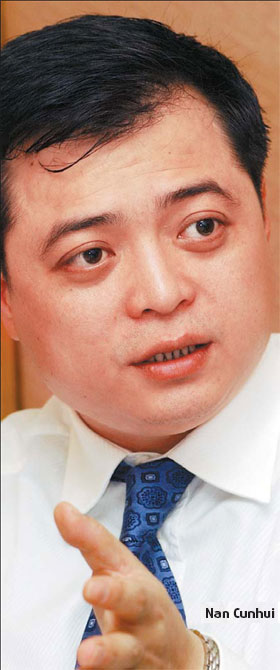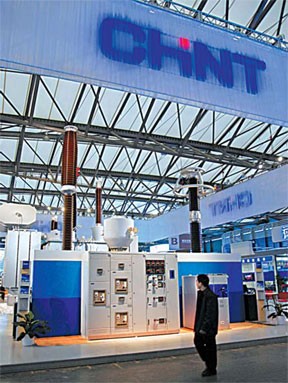

Nan Cunhui hit the headlines last year when he filed for an intellectual property right (IPR) case against a large multinational company - and won.
Nan, board chairman of Chint Group Corp, the largest low-voltage electrical apparatus producer in China and the third largest globally, sued France's Schneider Electric, one of the world's largest manufacturers of industrial equipment, for copying a number of patented Chint products. An intermediate court in Zhejiang province ordered the French firm to pay Chint 330 million yuan in damages, the largest payout for patent infringement in China.

While protecting their own intellectual property in China has become an old topic for multinational companies, now alarm bells are ringing. They need also make sure that they are not guilty of infringing Chinese local companies' patents.
As Chint moved into international markets, Nan has discovered that suing business rivals for patent infringement is a common tactic for multinational corporations looking to elbow out competitors in a bid to dominate the market.
"We can also do what they do," Nan says.
"I don't mind how much Schneider pays us. What I care about is winning the case. It will help change the stereotype that it is Chinese companies that are always accused in IPR cases. It will also help boost the confidence of Chinese enterprises and encourage them to pursue technological innovation," Nan adds.
Chint has also rejected several takeover approaches from Schneider. While many were puzzled by Nan's refusal to sell to the multinational giant, the Chint chairman, who started the company when he was 21 and successfully built it up, has long-term ambitions for the group.
With sales of 18 billion yuan in 2006, Chint is not only China's largest low-voltage electrical equipment producer, but also has expanded its production range into high and medium voltage electrical apparatus, power transmission and distribution equipment, measuring meters and instruments, electrical products for construction, automation control devices. Chint has been investing 5 percent of its annual sales into research and development.
The Wenzhou-based company is now planning to list its low-voltage electrical equipment business on the A-share market.
In Wenzhou, Nan's hometown, a city in Zhejiang province, the 45-year-old entrepreneur is a local magnate. A survey by the Wenzhou Times newspaper showed that Nan was one of young people's 10 idols, standing side by side with Lei Feng, a Chinese soldier whose selfless actions toward people around him makes him in the eyes of the people somewhat of a natioanl role model, and acclaimed movie director, Zhang Yimou. He was the only businessman from Wenzhou who entered the list.
In 2000, Nan, at the age of 37, was named one of "the 100 young Chinese who may influence China in the 21st century" by the China Youth magazine. The 100 people included scientists, economists, artists and entrepreneurs, all aged between 19 and 45. Nan's achievement of emerging from a shoe-repairer into China's low-voltage electric equipment tycoon was part of the reason for him to enter the list. But more importantly, the magazine said, Nan has set a good example for Chinese private entrepreneurs to modernize their enterprises. Nan diversified the stock ownership of Chint and turned the family business into a shareholding company in the mid 1990s. By increasing the number of shareholders, Nan's personal shares in Chint have fallen to 20 percent, with other cofounders holding around 10 percent.
Fight for survival
More than 500 kilometers south of Shanghai, Wenzhou could easily be missed or ignored. Encircled by mountains in the west and the ocean in the east, Wenzhou was geographically isolated from the rest of the prosperous Zhejiang province. It lacks natural resources and is also short of farmland. Its overland transport system is also limited.
But over the last decade Wenzhou could almost be described as a synonym for China's rising entrepreneurial spirit.
Its citizens are acute business people who seem to have the ability to turn their hands to any trade profitably. They often start with small businesses and 90 percent of the local economy is based in the private sector. Wenzhou is China's largest manufacturer of small goods such as lighters and spectacles. The "Wenzhou Model", in many ways, symbolizes the rise of China's private sector.
"Because life is tough in Wenzhou, we had to think of ways to survive and to overcome our difficulties," Nan says.
Nan also started his business under the pressure of survival.
Despite being one of the best students at school, Nan dropped out at the age of 13 due to poverty and helped his parents feed the family by repairing shoes for others.
"The three years of shoe repairing business taught me the importance of honesty and quality when doing business," Nan recalls.
But more importantly, he found useful market information by repairing shoes. While repairing shoes for customers, Nan talked with them and asked what kind of business they did. He heard the name "low-voltage electric appliance" quite often and, by telling from the excitement on their faces, he vaguely believed that such business would have good prospect.
Nan rented a small counter in a store with three friends and started to sell low-voltage electric appliances, such as switch boxes, which were assembled by themselves from small components. None one of the four young men had professional background in this field. But Nan gradually gained an understanding of the principles of the appliances by dissembling and assembling products he bought from State-owned enterprises.
Working day and night, they earned 35 yuan in the first month. He could earn about 20 yuan a day by repairing shoes, but Nan didn't feel defeated. "At least I didn't lose money," he recalls.
In 1984 Nan and his elementary school friend, Hu Chengzhong opened a switch factory, which is the predecessor of Chint. They each invested 15,000 yuan and held 50 percent stakes of the factory.
Shortly afterwards, they broke up peacefully and each set up their own family business. Nan founded Chint and Hu established Delixi Electric Appliance. While Delixi diversified into other business such as real estate and logistics, Nan concentrated on specialization and developed Chint into China's largest low-voltage equipment company.
Concentration
Nan applies Chint's fast growth to its two-decade concentration on specializing in the electrical apparatus industry.
"If you are determined to grow your business, you shouldn't touch businesses that are not relevant to it," Nan says.
"It is relatively easier to copy simple things. You would have a better chance to win," he adds.
In fact Nan believes Chint still has a long way to explore to catch up with its international counterparts in the electrical apparatus industry. "In the low-voltage electrical apparatus business alone, the company's annual sales have reached 100 billion yuan," Nan says.
When working hard to realize a dream, Nan says, one should be able to resist temptation. He is referring to his determination of not entering the real estate industry.
China's real estate boom has created numerous billionaires. Building commercial housing has become the most profitable investment for many Chinese private entrepreneurs as they diversify their businesses.
"Many people said I am a fool and missed the opportunity to earn at least 10 billion yuan in profit," Nan says.
"But I believe every industry has its own specialization. If I enter the real estate industry, I must devote 100 percent efforts to it and create a good and long-lasting housing brand. Unfortunately I don't have time to do that."
Nan says there are three preconditions for an enterprise to diversify its business. First, the company holds a controlling share in the market. Secondly, the market is getting saturated and there are few opportunities for further development in this industry. Thirdly, the company has an excellent talent pool.
These circumstances are not apparent for Chint, Nan says. Despite being the country's largest low-voltage electrical apparatus producer, the domestic market is also a highly competitive battlefield for international giants. There is huge market potential in the electrical apparatus industry due to the country's fast economic growth. Third, Chint is still short of talented people.
Diversifying stock ownership

Most businesses in Wenzhou start as family operation. But with their production expansion and heated competition following China's entry into the World Trade Organization, they have to transform from family orientation groups to modern management. Chint is an outstanding example of such a transition.
Nan used to hold over 40 percent of shares in Chint, whose annual sales reached 50 million yuan in the early 1990s. At that time, many small companies signed agreements with Chint to produce products using its label. But Nan found the drawback of this kind of business mode: The relationship was too loose and it was hard to manage the partners. So he merged with and acquired 48 of these companies by selling stocks to them. In 1994, Chint Group Corp was formally launched and Nan's personal shares fell to 30 percent.
Nan launched a second "ownership revolution" in 1998 as he found a deadly shortcoming for a family business was attracting and retaining talented employees. He implemented a stock distribution system in his core business and allowed professional managers, technicians and sales representatives to hold shares. As a result the number of key shareholders expanded from 10 to over 100. He proceeded further to separate ownership and management and established a full-fledged shareholding system. Nan's personal shares fell to 20 percent.
Although the reform ignited heated disputes among his relatives, Nan says, if necessary, he will continue to reform even if his shares fall to only 5 percent.
(China Daily 06/16/2008 page12)













